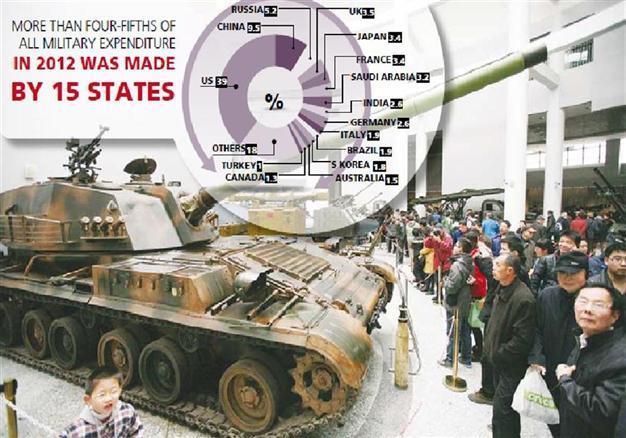Global military spending droped in ’12, says survey
STOCKHOLM

People visit a weapons museum in China. Beijing is the world’s fifth-largest arms exporter and is continuously ramping up its military spending each year. REUTERS photo
Global military spending on weapons and services dropped in 2012 for the first time in more than a decade due to budget cuts in the United States and Europe but rose in Russia, China and the Middle East, a leading think-tank said yesterday.Turkey, meanwhile, continued to spend the 15th most out of world countries.
Military expenditure as a whole fell 0.5 percent to $1.75 trillion last year in the first decline in real terms since 1998, the Stockholm International Peace Research Institute (SIPRI), which carries out research on international security, armaments and disarmament, said yesterday.
The U.S. and its European allies face tight budgets in an economic downturn and have scaled back involvement in conflicts in Iraq and Afghanistan. Military expenditure in the U.S., the world’s biggest spender by far with a budget about five times that of China, fell 6 percent and stood below 40 percent of the global total for the first time since the collapse of the Soviet Union more than 20 years ago, SIPRI said.
The U.S. pulled its troops out of Iraq more than a year ago and is winding down its war in Afghanistan under a plan for a pullout by the end of 2014. The Pentagon is seeking to cut hundreds of billions of dollars in costs and this month, new Defense Secretary Chuck Hagel warned the U.S. military to brace for a new round of belt-tightening.
“We are seeing what may be the beginning of a shift in the balance of world military spending from Western countries to emerging regions, as austerity policies and the drawdown in Afghanistan reduce spending in the former, while economic growth funds continuing increases elsewhere,” said Sam Perlo-Freeman, director of SIPRI’s Military Expenditure and Arms Production Program. In Europe, austerity measures prompted by the financial crisis that started in 2008 have forced NATO members to cut back spending by 10 percent.
But the world’s second biggest economy, China, is ramping up spending and registered 7.8 percent growth in 2012 from the year before, up 175 percent from 2003. China’s military is set to receive new submarines, ships, missiles, a stealth fighter and aircraft carrier combat groups. China is now the world’s fifth-largest arms exporter, replacing Britain in the list of the top five arms dealing countries between 2008 and 2012, SIPRI said in a March report.
US four times bigger than China
Russia’s military spending rose 16 percent in 2012, which analysts said reflected President Vladimir Putin’s efforts since he returned to power last May to bolster the armed forces and improve weaponry.
“All the indications are that world military spending is likely to keep falling for the next two to three years – at least until NATO completes its withdrawal from Afghanistan at the end of 2014,” Perlo-Freeman said. “However, spending in emerging regions will probably go on rising, so the world total will probably bottom out after that.”
According to the director, despite the new trends, at $682 billion, U.S. military spending is still more than four times larger than that of number two on the list, China, estimated by SIPRI at $166 billion. “The U.S. and its allies are still responsible for the great majority of world military spending,” said Perlo-Freeman.
Turkey stayed at 15th on the list with $18.2 billion in expenditures despite small increases. According to the SIPRI data, Turkey spent 2.3 percent of its GDP on military expenditure in 2012, down from 3.4 percent of its GDP in 2003. Military spending is up around 8 percent in the Middle East and North Africa. Saudi Arabia and Oman have accounted for much of the increase in their efforts to counter the strategic challenge posed by Iran. Asia also recorded an overall rise in spending of 3.3 percent last year.
















